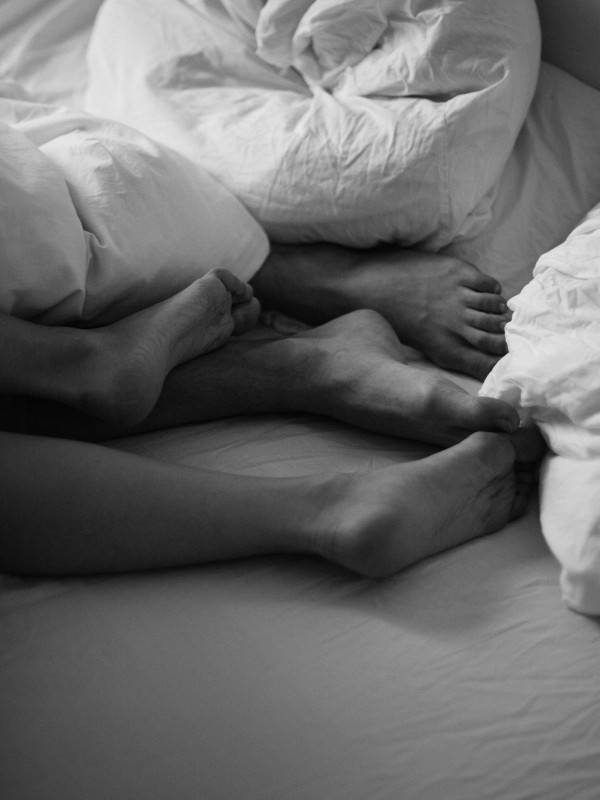8 Reasons Sex Might Be Painful
Why can sex sometimes feel painful?
As Medical Director of Intimate You, Dr Tracey Sims, explains, “Pain during sex is quite common and can be caused by a variety of things, such as an illness or infection, or a physical or psychological problem.” Below, she lists the eight most common reasons:
Vaginal dryness: This can be a common problem for post-menopausal women with vulvovaginal atrophy, as well as pre-menopausal women with low levels of oestrogen, such as breastfeeding mothers, those who have had a hysterectomy and those who have received chemotherapy.
Infections: Fungal infections such as thrush, urinary tract infections and sexually transmitted infections can contribute to painful sex, along with causing soreness or itching.
Underlying reproductive system & bowl conditions: Such as endometriosis, pelvic inflammatory disease (PID), irritable bowel syndrome (IBS), constipation and fibroids growing near your vagina or cervix.
Vulvodynia: If you have persistent, unexplained pain in the vulva (the skin surrounding the entrance to the vagina), it could be vulvodynia. This condition can affect women of all ages, and often occurs in women who are otherwise healthy.
Vaginismus: A condition where muscles in or around the vagina shut tightly, making sex painful or impossible.
Irritation or allergy: This can be caused by certain lubricants, spermicides, latex condoms or products such as soap and shampoo.
Your partner’s size: This could be emphasised by vaginal dryness, positioning and stress about the situation being uncomfortable.
Lack of sexual response: Reasons for this include a lack of arousal, tiredness, stress and anxiety.
What should you do about it?
“It is really important for a couple to relax together, enjoy each other’s company and prioritise their relationship,” Dr Sims tells us. “Communication, openness and a willingness to experiment with positioning can go a long way to make sex more comfortable in most cases.”
But she adds that it’s important to rule out other gynaecologic conditions first – especially if the pain during or after sex is severe or recurrent: “It could be your body trying to tell you something, so don’t ignore it and see your GP or health care professional.”
And if you’ve tried both of the above and are still finding sex painful, there could an emotional reason or anxiety that's causing problems – if you think this could be the case, the NHS recommends asking your GP or sexual health clinic to refer you to a counsellor or sex therapist.
When it comes to general lifestyle changes, Dr Marilyn Glenville, nutritional therapist and author of The Natural Health Bible for Women, believes taking care of your vagina is key. Stop using any products you believe may be irritating your intimate areas immediately, and avoid talcum powder, hot baths, perfumed toilet papers and bath oils and foams. “Don’t wash the inside of your vagina with soap as this will dry out the skin,” she says. “The vagina is self-cleansing and, in most cases, warm water is all that you need to wash it.”
For those struggling to enjoy sex, she recommends aromatherapy – choosing sexually stimulating essential oils that can help put you in the mood for lovemaking – alongside practicing Kegel exercises and working out regularly. “Not only can the latter help put you in the mood thanks to the endorphin rush working out provides, moving regularly can help keep your vagina supple and lubricated,” she adds.
How else can vaginal dryness, in particular, be treated?
Alongside aiming for at least 30 minutes of moderate exercise five to six times a week, Glenville advises drinking six to eight glasses of water daily to keep your vaginal tissues hydrated and having more sex – which may sound counterintuitive to those in pain, but could actually pay off in the long run.
“Regular sex and masturbation can help because women who have sex once or twice a week tend to lubricate more rapidly when aroused,” she explains. “Spend longer on foreplay, too, as it can help you to lubricate. You may find it helpful to use a good-quality, natural lubricant before sex, too.”
She explains that if your hormones are causing vaginal dryness, your doctor may suggest hormone replacement therapy (HRT) or prescribe a cream or pessary containing oestrogen to be used vaginally – but a dietary approach can also be used, if you’d prefer to take a more natural route.
“For hormone balance it’s especially important to make sure you eat enough essential fatty acids or EFAs and to supplement with fish oil,” she says (see her top supplement suggestions below). “A low- or no-fat diet can make your whole body drier, including the vagina.”
Glenville also reveals it’s important to stock up on phytoestrogens, as research shows that foods rich in the plant compound, such as soya, chickpeas, lentils and flaxseeds, can change the cells of the vagina so that they become more soft, elastic and moist – all essential for pain-free intercourse.
“Eating plain organic yoghurt with live culture four to five times a week may also help to maintain healthy intestinal flora and vaginal balance,” she adds.
Dr Marilyn Glenville’s top 3 supplements for treating vaginal dryness…
Omega-3 fish oil: 1000mg, including 700mg EPA and 500mg DHA, daily. Essential fats are a necessary part of hormone balance and they can help to keep the body lubricated including the vagina. I recommend NHP’s Omega 3 Plus to my clients.
Vitamin C: 500mg twice daily. This nutrient is essential for healthy collagen formation and collagen gives tissue elasticity.
Women’s multivitamins: Take a good-quality woman’s multivitamin and mineral (like NHP’s Meno Support) that contains powerful antioxidants to aid with anti-ageing, including selenium, zinc and vitamin E – which has also been proven to specifically help vaginal dryness.
For more information about pain during sex, visit NHS.uk
DISCLAIMER: We endeavour to always credit the correct original source of every image we use. If you think a credit may be incorrect, please contact us at info@sheerluxe.com.






